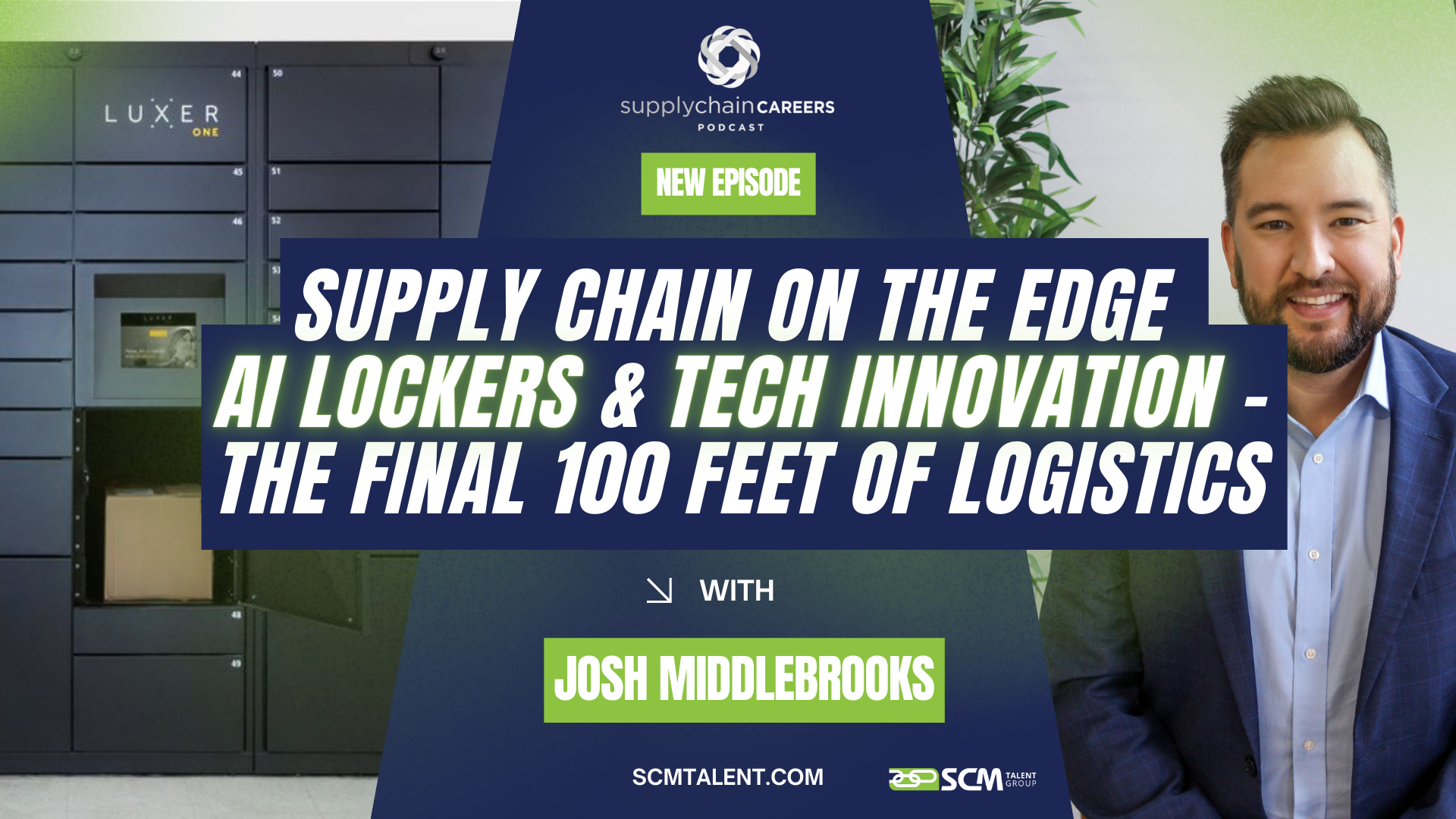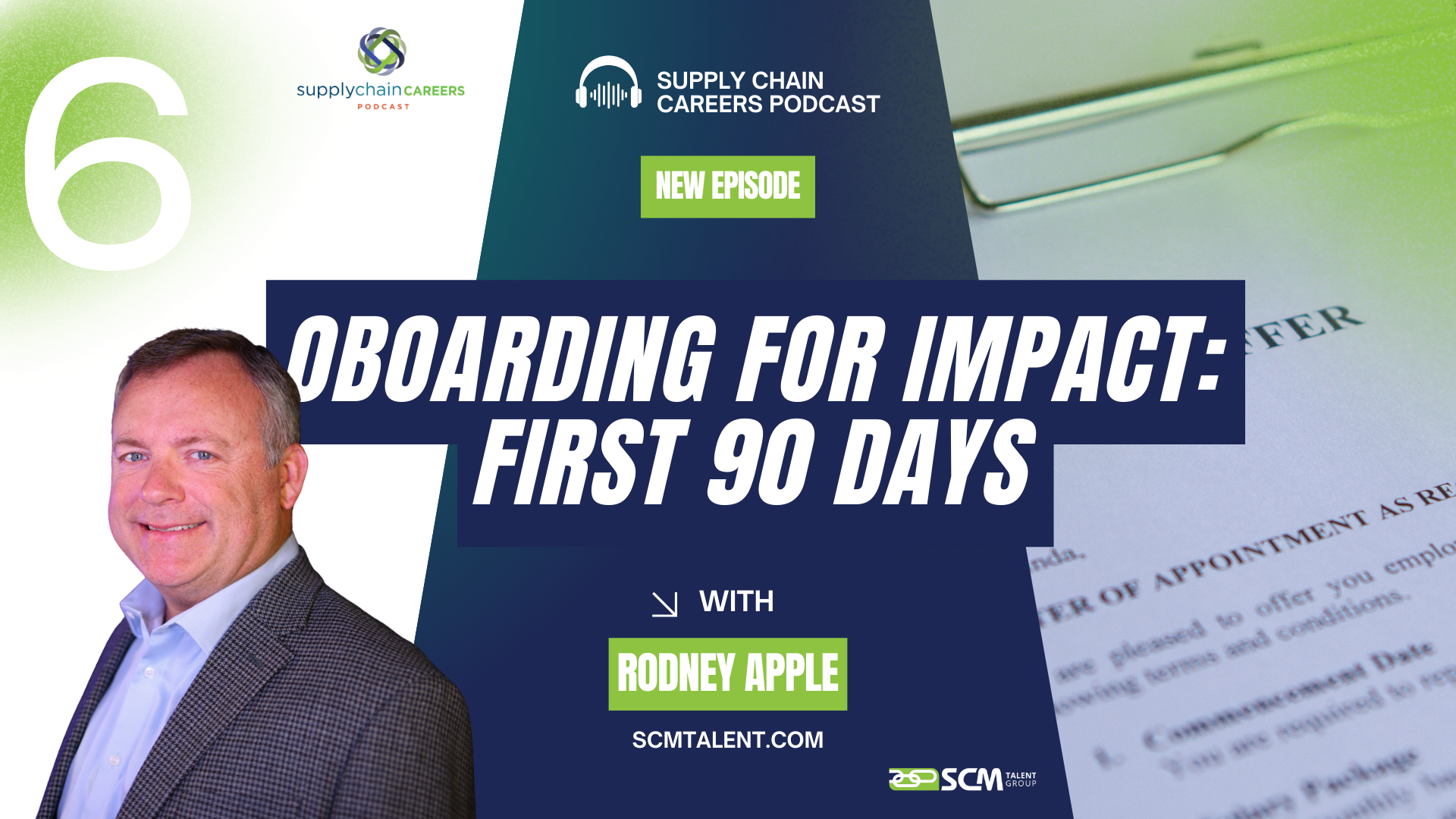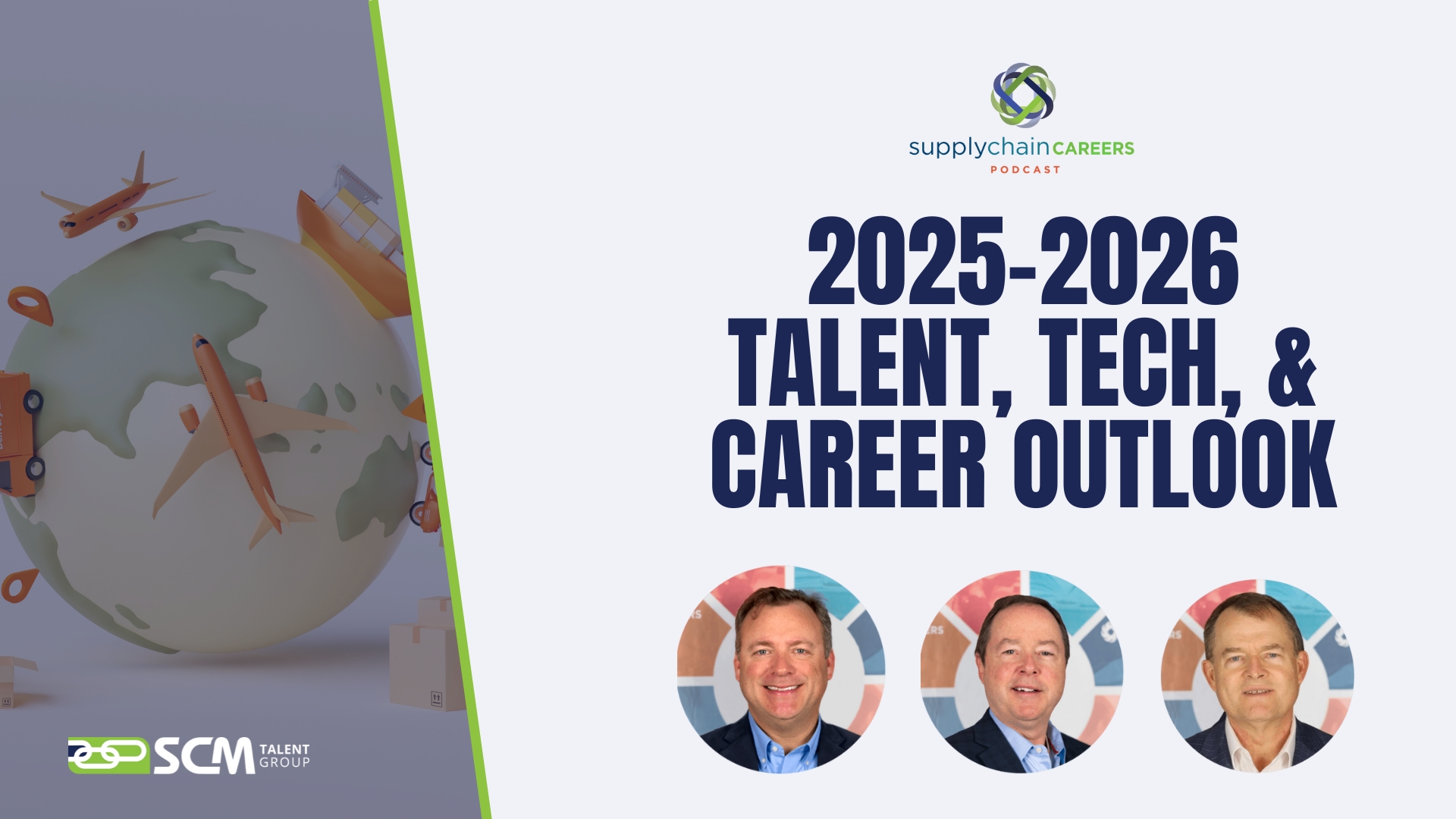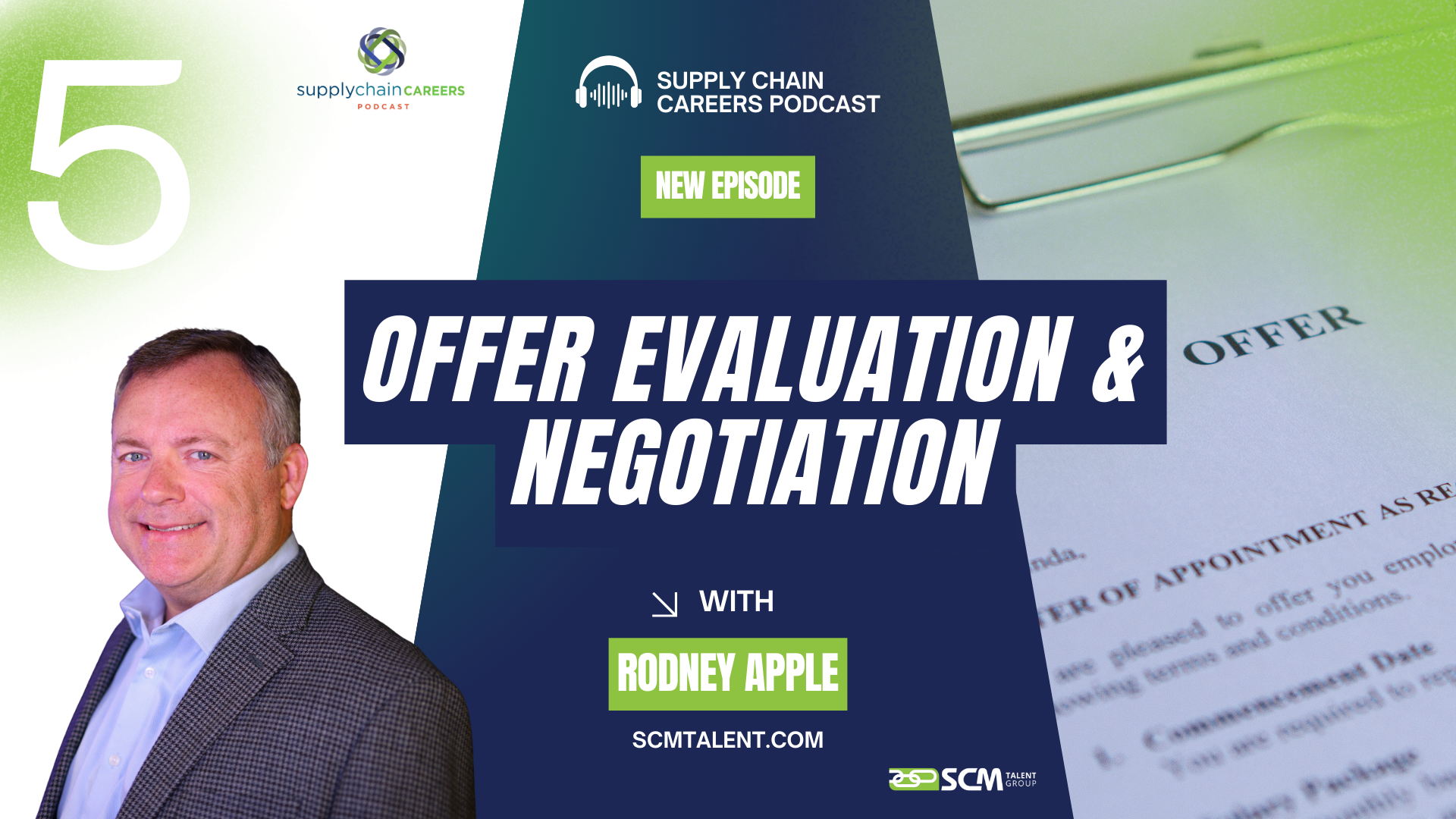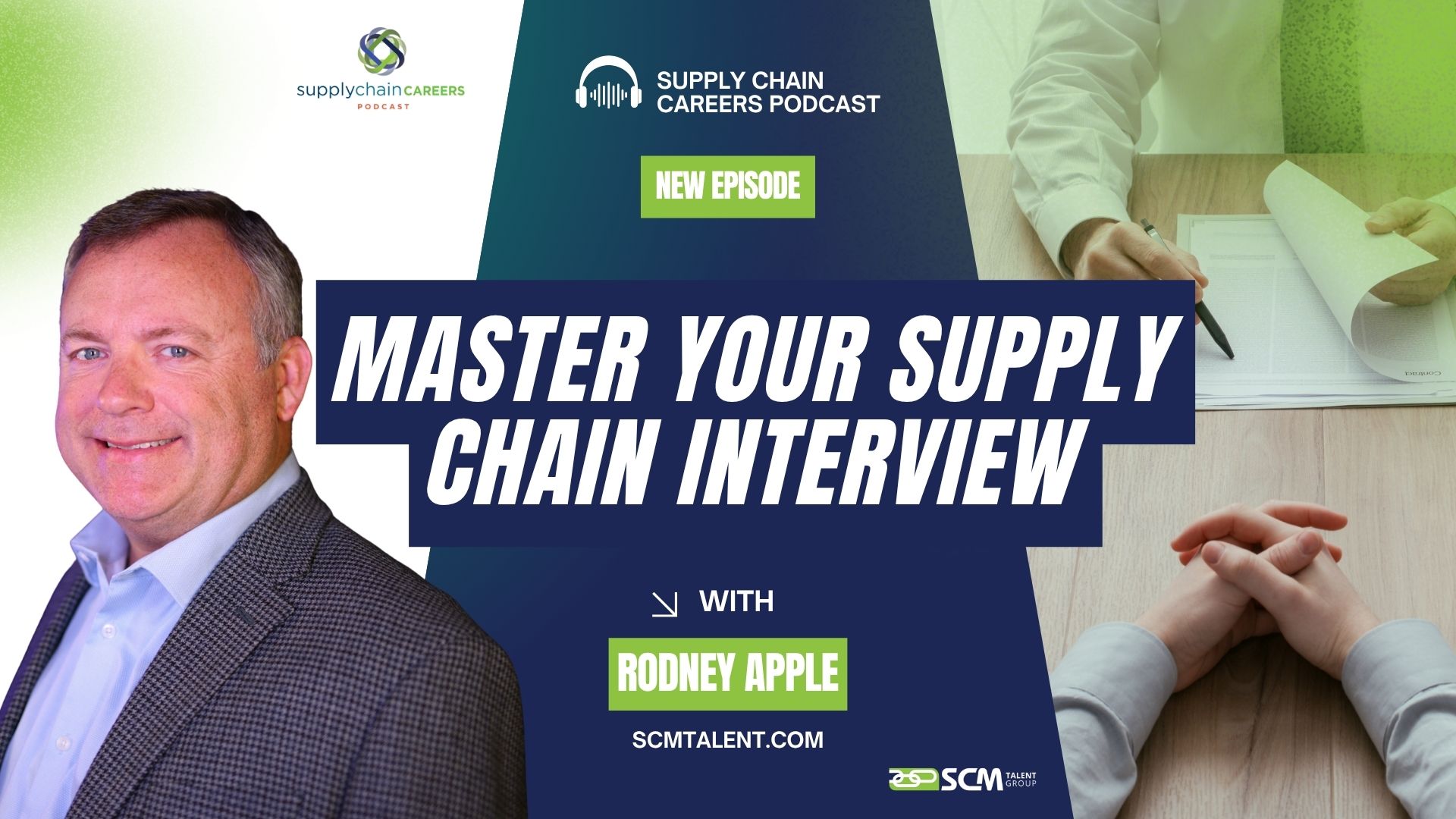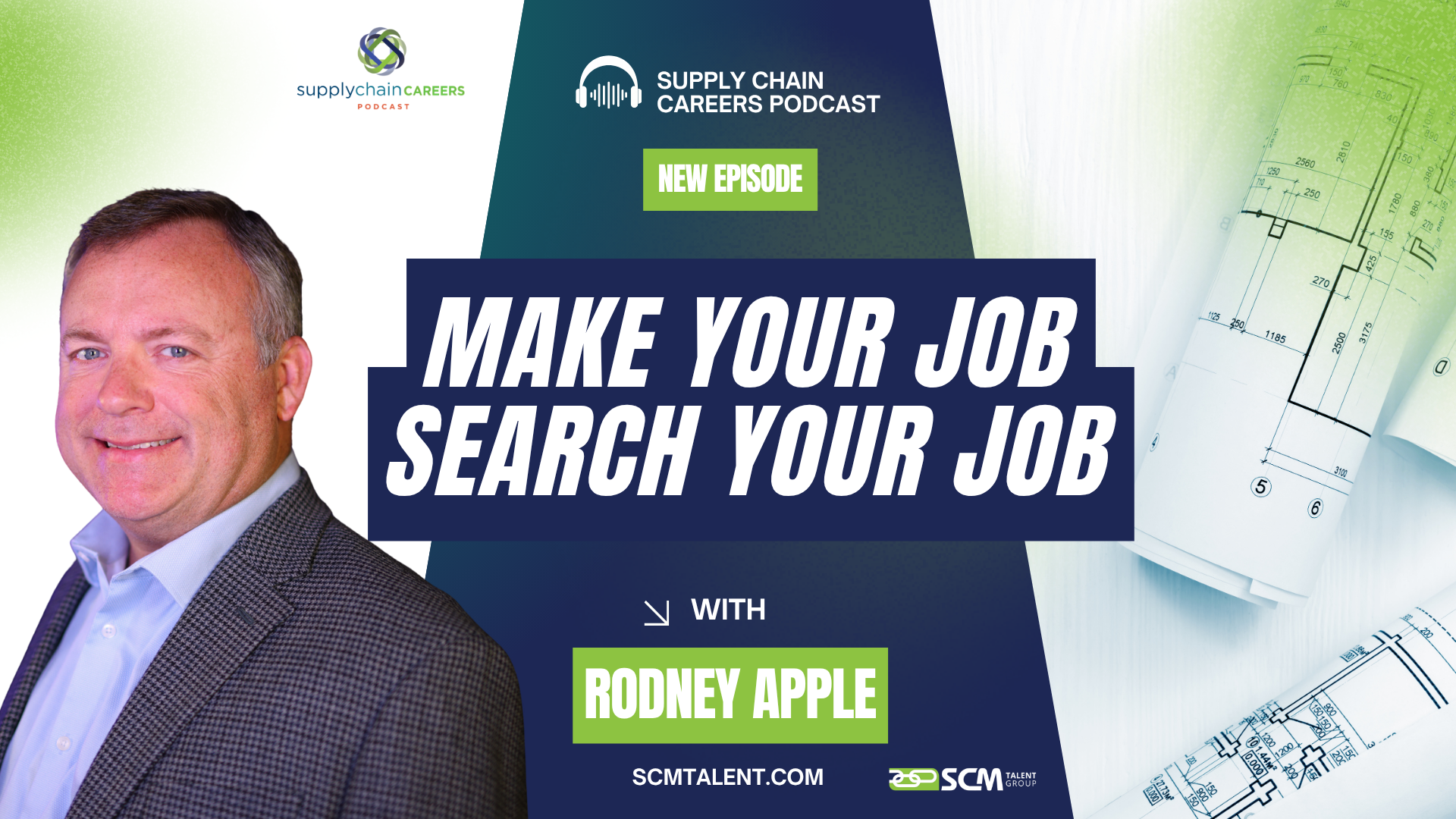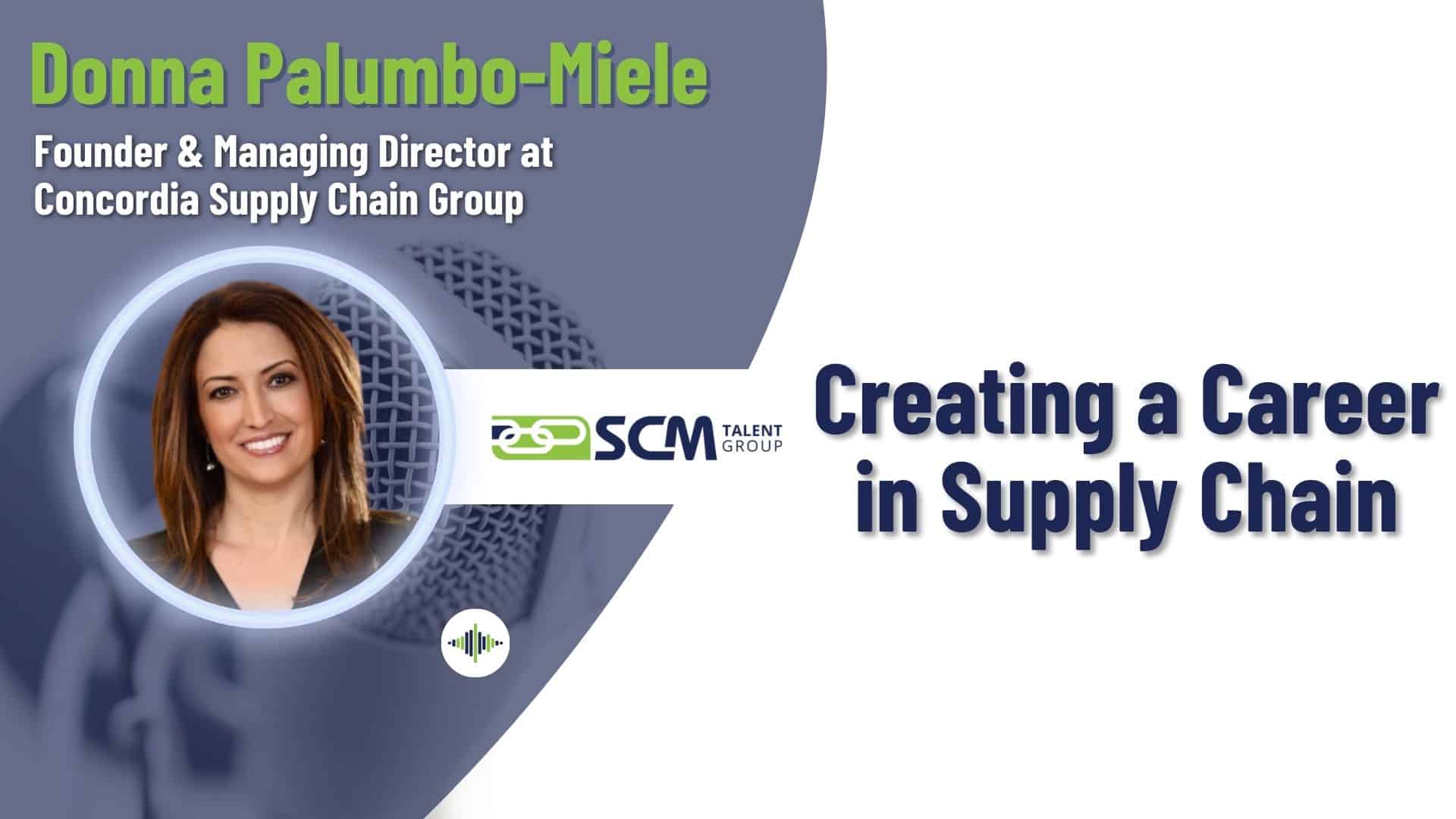
Podcast: Creating a Career in Supply Chain – with Founder at Concordia Supply Chain Group, Donna Palumbo-Miele
Hosts: Rodney Apple and Mike Ogle
In This Episode:
Donna Palumbo-Miele, the Founder of Concordia Supply Chain Group, joins us to delve deep into the nuances of strategic sourcing and procurement advisory services. With a career spanning iconic organizations like Disney, Johnson & Johnson, and Bloomberg, Donna offers invaluable insights into the evolving landscape of supply chain strategies. She highlights the transformative role of technologies, dynamic partnerships, risk management, and sustainability. To Donna, the supply chain is a synergistic ecosystem where suppliers aren’t just vendors but valuable hubs of learning and innovation. She emphasizes the importance of continuous learning in her career trajectory and concludes with sage advice: nurture curiosity and courage, and master the art of listening, learning, and leading.
Who is Donna Palumbo-Miele?
Donna Palumbo-Miele is an influential thought leader in the global supply chain and sourcing and procurement space having served in the technology, finance, entertainment, hospitality, and healthcare industries.
Donna is the founder of Concordia Supply Chain Group, a WBENC-certified advisory services company providing comprehensive consulting services in strategic sourcing, procurement, supply chain, corporate social responsibility, supplier relationship management, and risk mitigation. She has become an instrumental business partner for both public and private sector clients cultivating strong relationships and offering decisive guidance to C-level executives while championing diversity.
Her career includes leadership roles at The Walt Disney Company, Johnson & Johnson, and Bloomberg. Donna has been recognized for her outstanding industry achievements, receiving multiple honors and awards.
Complementing her work experience, Donna serves in various board and advisory roles including as vice chair of the Council of Supply Chain Management Professionals (CSCMP) and board director for the Women’s Forum of New York.
What could a career journey be in the different professions? And I started looking at supply chain and back then it was called business logistics was the major. And so, I declared that as my major and moved to the program. Like just anything else, what you put into it is what you get out of it.
And because there’s so many different disciplines within the supply chain, I pursued internships. My first internship was with Johnson & Johnson, it was in the distribution services side. And my second internship was with Veeder Root at the time it was a division of Danaher, and I was in procurement and manufacturing.
So very different internships. So, it gave me Different perspectives and different learnings of the different functions within the supply chain, both very valuable experiences, different teams, different initiatives I got to work on. But I would say that the biggest influences were. The opportunities that exist or could exist again, and it’s up to the person and what journey you take in your profession.
But there was so much forward thinking and, in the profession, and where the profession could go, the opportunities when you think about the supply chain and we’re all consumers and how the supply chain impacts us as consumers. So, I really felt, okay, this is a place I can continue to learn and grow.
And I always say I’m committed to lifelong learning and I truly am. That was the start of it. And you continue on that path and that journey. But those learning experiences through the academic side and the internships really Provided that experience as I went out into the workforce.
[00:04:09] Rodney Apple: Excellent. And, we know Penn State is one of the founding universities in the supply chain space. So back when I was recruiting 20 some years ago in this space, it was really just a handful of companies or universities that taught. Supply chain and related disciplines and they have such a great reputation.I know I’ve recruited my fair share of students and alumni out of there over the years. Donna, you transitioned as I look at your LinkedIn profile, you’ve worked for some big brands and big companies. And I see you’ve carved out a niche in the. sourcing procurement space, which has evolved over time.
But could you tell us about some of these major career transitions that you’ve made and some of the lessons that you learn as you move from company to company?
[00:04:52] Donna Palumbo-Miele: Sure. The transitions have been fantastic. I’ll start out with that. And I’ve, I had the opportunity to transition. Across industries, even size of the company.So, I started my career after Penn State actually consulting in supply chain with Ernst and Young. So now it’s come full circle years later. From consulting to a .com startup, to big corporate. I spent 20 years in big corporate, 15 of those with the Walt Disney Company. And, being able to work in consulting, e commerce, entertainment, hospitality, healthcare, tech.
So many different opportunities, so many different experiences with each different stakeholder, different engagements different projects. And through that, I had the opportunity to relocate multiple times. So, I lived in different parts of the country. And I and the biggest part of it was privileged to work with some really amazing people over the years.
And I always think a lot of things of people, process, and technology. It starts with people. I led and supported some unique and iconic projects in my career. And going back to that, being committed to lifelong learning, there’s always something to learn regardless of what that project, that engagement, that team environment is.
So yes, and then as it mentioned, you brought it full circle and now consulting.
[00:06:10] Rodney Apple: Awesome. And I would imagine like working in supply chain at Walt Disney has probably one of the more fascinating and unique roles or companies that you can work for. With having gone there for the first time with my kids this past January, it’s like a kid in a candy store for me. [00:06:28] Donna Palumbo-Miele: Fantastic. Yes. So, working for Disney, a fun company, amazing in all they do to provide such a fantastic guest experience to those that visit the parks and the multiple different businesses within the Walt Disney Company.And I had the opportunity to work on and I did work on some of those unique and iconic projects supported here in the United States and offshore. Traveled quite a bit internationally when I worked for the Walt Disney Company as well, so I have that global. Sourcing experience as well and working with different regions and those in different regions.
It was a fantastic experience. And again, the people that I worked with just in how creative the Walt Disney company is.
[00:07:14] Mike Ogle: So, what inspired you to start your own company Concordia Supply Chain Group? And what does the company specialize in and how do you help and serve your customers? [00:07:23] Donna Palumbo-Miele: I guess a number of reasons. So, I loved working in corporate again, worked for some very big brands that you know of, and listeners are aware of and the projects that I’ve worked on, but I had given it thought for a little while of potentially going out on my own, and then I decided to do so more than three years ago.And this, over the years, I’ve worked with these different very diverse companies, different spaces, different industries, and doing this also provides that opportunity. I get to enjoy the diversity of the company and the organizations that I’m working with now, private, public, academia, nonprofit but each engagement has that unique set of.
Needs and solutions and in working with them, every organization has a different story. Each function has a different story. So having a big corporate experience, I understand what organizations and teams need and now being on the other side of the table or being a service provider. You have that further understanding and the experience, having this experience, I have the privilege I’m engaging and collaborating with some really forward moving companies and people in different industries.
Some of the most fascinating conversations are with the practitioners and academics investors, young professional’s other women leaders and male founders as well. So, it just A different space, but a lot of still the same learnings.
[00:08:52] Rodney Apple: And I do see you’ve got a lot of great experience in that. Sourcing and procurement space. It’s an area that we do a tremendous amount of recruiting within. And as a practitioner, and me as a kind of recruiter in that space, it sure has evolved continues to evolve over the years.But I would love to hear from your perspective, what has fundamentally changed in this area from when you started your career until now?
[00:09:16] Donna Palumbo-Miele: Strategies have definitely changed how we look at the supply chain, how we look at the functions within supply chain, what we’re doing now and what companies are doing now and sourcing procurement from the types of technology that are available to adopt.Technology is an enabler. There’s a number of different technology solutions that didn’t exist before. How do we work smarter, more efficiently? We also engage differently and more strategically with suppliers. Suppliers are partners, not that they weren’t partners before, but more companies are.
Developing with suppliers. They’re innovating with suppliers. They’re creating together and really building these strong bonds. And be able to really work together and find new solutions who really say we can’t go at it alone and. Companies need suppliers just as suppliers need companies as well.
And you can really develop strategic partnerships. And they don’t have to necessarily be with high spend suppliers. You could have a small spend supplier and it’s critical to your business. It could be a creative design. It could be a very unique capability that they have. But They’re critical to your operations.
But engaging with suppliers as a source of innovation that suppliers have solutions that we all don’t know. And bringing those minds together can really be groundbreaking, breaking in a number of ways. Again, technology, there’s significant advancements in technology.
Technology’s advancing at such a rapid pace and those solutions that are out there really enable companies to solve complexities that we may not have known how to solve for before or did so in more of a tactical way. But that’s what worked in the past. But now it’s identifying these different types of solutions and opportunities to Improved process and drive standardization, reduce risk.
We look at risk differently than or define it differently than we may have in the past.
[00:011:13] Rodney Apple: It’s become a big deal with all the disruptions in supply chain and it’s almost core to the job, these days. And then we see sustainability as we. Go through a lot of our own resources, what can we do to get that circular economy in place and that sort of is Seem to be embedded in that sourcing procurement function the risk management Sustainability in addition to the typical things around quality service costs, etc. [00:11:36] Donna Palumbo-Miele: Suppliers, different questions than we may have asked before around sustainability.When you look at ESG some of those questions may not have been asked in the past. And, as we as companies evolve their strategies and they’re scaling you want to be best in class. They’re evaluating suppliers differently, or there’s different metrics now not that the metrics weren’t effective or the right ones in the past, but we have new learnings each day and each company in each function when they’re looking at their strategy.
We use risk as an example. Risk varies by industry by function, and it’s understanding what’s the level of risk. There’s all types, but you’re thinking about what how does risk, how does sustainability, how does cost how does that, how is that part of your strategy? As you look to be best in class company or provide the best product.
12:30 – 13:09[SPONSOR BREAK MESSAGE] [00:13:09] Mike Ogle: So how are procurement and supply chain roles evolving to deal with some of these changes and in shaping the evolution of their roles?
[00:13:20] Donna Palumbo-Miele: I feel we have a lot more opportunity. I mentioned technology earlier. Such advancement in technology and identifying what’s the right technology for your business that can help scale your business become more efficient again, risk and resiliency.We’re asking different questions around risk and resiliency. And what does that mean to your business? And transformations defining transformation now versus years ago. But functions go through transformations, processes go through a transformation. And when you think about the goals and objectives of a team, some of the skill sets in the past, they still exist and they’re still important.
And they likely will be. Very important in the future, soft skills, very critical and important to what we do, effectively communicating partnership collaboration. Our supply chain it’s an ecosystem. It’s integrated. And if you’re working in a function, it’s very likely you’re going to collaborate with others in another function because of how complex supply chains can be and how integrated they are. It’s very likely in the roles and supply chain, you’ll continue to work in teams. And there’s probably even more engagement across teams because of cross functional engagement different. Projects, the collaboration across functions in the supply chain adopting again, use of technology.
And, understanding also, if we go back, for example, risk and I mentioned this earlier defining risk. And what does that mean? Is it capacity? Is it a liability? Financial and, Thank you. There’s different questions and different metrics to understand. So, the questions we were asking before vary now and another big thing is being able analytical.
There’s so much data and taking that data to make an informed decision as part of your strategy or developing your strategy. And There’s a lot more information out there now and being able to use it the right way to make the best decisions.
[00:15:18] Rodney Apple: And as a follow up, Donna as you talked about technology, artificial intelligence, it’s been out there interweaving here and there in business and our lives.But all of a sudden, this chat GPT comes in and just, immediately it’s taking it to a whole nother level. And now you’ve got all these. competing providers that are popping up. It’s the advancement is all of a sudden just breathtaking. It’s going to, a whole nother stratosphere.
Any perspectives of how AI is going to shape and transform procurement and supply chain here in the near future as well as down the road? Any thoughts there?
[00:16:00] Donna Palumbo-Miele: Technology, we know it’s advancing quite rapidly. Look back years ago versus now. Technology is an enabler, and an AI can be an enabler to a business as well, to business operations. [00:16:15] Rodney Apple: Yeah, I would imagine with the like contracting, I know just writing. It takes a lot of thought. Now you have somebody that can help you think and give you examples and regurgitate.I think that’s going to help enable the contracting that maybe accelerate and speed up. But it’s fascinating. It’ll be interesting to watch this unfold and how it’s going to change the way we do and get work done.
[00:16:38] Donna Palumbo-Miele: Yeah. And just in technology in general, how can we be more efficient and be more effective in our jobs?There might be solutions there that can really help companies.
[00:16:48] Mike Ogle: Yeah, absolutely. I see a lot with AI and even for the past five, eight years or so when these kinds of things come up in conversations. The number one way that companies seem to be able to benefit is just to be able to make their people more productive, be able to provide them with ideas that things that they don’t have to search for in the same way that they did in the past.But trying to learn to use them, we’re struggling ourselves just trying to do it within our own supply chain careers business and how to apply those things. So when you mentioned some of the skills, particularly soft skills, previously, you think about relationship building and how critical it is for roles in procurement.
From internal stakeholders you’re assigned to support to external suppliers that are crucial to the success of the business. What are some of the key tactics and strategies you recommend for building and strengthening the brand? All those relationships.
[00:17:40] Donna Palumbo-Miele: Sure. A lot of it begins with speaking to the basics, communication, collaboration, engagement your internal stakeholders, their partners of yours.They have expertise in their space. You learn from your internal partners. You also learn from suppliers as well. Supply chain, it’s an ecosystem interconnected, it’s integrated and functions that they need to collaborate. And these functions, they could be your stakeholders. As well as your partners.
So, for example it, I’ve had finance as a stakeholder, but they’re also a partner. If I’m doing financial modeling around looking at a contract or helping the risk team on a need that they have. But they’re also my stakeholder, but they’re looking at agreements. Is there any risk in an agreement that we had? And again, I mentioned risk, areas of risks have increased and, understanding types of risk and there’s risk teams within organizations and utilizing as a, them as a partner, but genuinely learning from one another. You can utilize suppliers as a source of knowledge and best practices. You engage your stakeholders. I think it’s important engaging stakeholders in conversations with suppliers. Suppliers can hear firsthand the needs and challenges of the business that you as a sourcing professional are supporting and you’re coming together to find that solution.
And sometimes we can’t always figure it out or determine the best solution on our own. But coming together in that cross functional stakeholder together. Sourcing a procurement and the supplier and having those conversations.
[00:19:11] Rodney Apple: Donna, you touched on continuous learning.I think that’s super important for really all employees that are out there working. But in supply chain, I think it’s especially important as things, as we’ve talked about, are rapidly advancing with technology and so forth. What are things you do personally to improve your career?
What types of information do you read? What kind of events or associations do you belong to? And how do you leverage your network to continuously improve your career?
[00:19:36] Donna Palumbo-Miele: Sure. Being committed to lifelong learning. And one of the ways I stay active in the profession not just through how I serve my clients, but council supply chain management professionals the largest supply chain organization out there and provide education and networking opportunities for their members they have.And there’s a number of ways. There’s a number of resources and reports that they put out. They have an annual conference every year. There’s roundtables in a number of the cities across the U. S. and in in Europe. And staying active with that I continuously build my network. I learn from others through the webinar’s information exchanges, speakers.
I’m also part of the Women’s Forum of New York. And that is a group of professionals primarily from the New York area. And they have a number of different sessions around leadership and serving on boards. And it’s just great to hear from so many others and what the organization does to give back to the community and other professionals as well.
I read a lot and there’s so many ways to consume knowledge now on your phone, on your computer, so it’s endless. But for me, I feel it’s important to keep up with the knowledge and to stay relevant. And that’s 1 thing I suggest and always recommend others. And, I’ll have mentees come to me and they’ll ask me a very similar question.
And I would say, Continuous improvement, continuous learning, and doing so by reading, listening to others, listening to podcasts, and taking that knowledge and, how can you apply it to what you do in your job or how you serve your clients. It was a number of different events that I’ll go to.
I’ll go to different conferences, speak at different conferences and there’s that commitment, as I said, to learning, but it’s such diversity of thought by so many people. And going to these conferences is a great way to network and engage with people and hear their stories as well.
[00:21:30] Rodney Apple: And as a follow up, Donna and that is fascinating advice by the way. But it looks like you’re giving back to the industry, so to speak as well in the form of being an adjunct instructor at Virginia Tech. What kind of courses are you teaching there? [00:21:42] Donna Palumbo-Miele: I teach a sustainability course and another one sustainable purchasing and supply chain and it’s So fascinating to work with the students, and they’re so passionate about learning and the subject matter.So I’ve been an adjunct professor for more than 10 years. So, it’s just so rewarding to spend time with the students. And I love having the dialogue with them of what they’re learning, what they want to learn, how they can apply it to their career. So It’s interesting to hear you when they think about what they’re, they’ve already been on a journey and what that journey could look like.
So yeah, so very much enjoy it. And we’ll continue to give back in that way.
[00:22:20] Mike Ogle: Excellent. And what is the most important lesson that you’ve learned over your career? And do you have some top advice that you would give to someone beginning a career in supply chain or procurement? [00:22:32] Donna Palumbo-Miele: Oh gosh. So yes, probably lots.So, I guess I would start out with going back to the continuous learning and there’s so much to learn. And there’s so many ways to learn, but one thing is nobody’s perfect. We don’t have to be perfect.
Directional information is fine. That’s acceptable. So that was one of the things so we’re not so my message there is No one’s perfect. Understanding when 100 is required again, if it’s risk mitigation, etc. But be curious dig deeper, deeper, ask why. Some of the other thoughts that that I could share is when you’re thinking about your strategy and your processes and procedures, be curious in that.
And have courage. Part of my experience through my journey over the years is I get asked a lot about career movement and progression. Lateral moves are okay. You don’t have to climb the ladder straight up. I’ve taken lateral roles in my career. And again, each opportunity, is what you make of it, and what you learn from it.
And I’ve been provided with so many different experiences over those years, not just the industry, but the projects and engagements and cross functional teams, those global projects. But each of those you. Career moves are a new learning opportunity. Have a mentor, have a sponsor. They play different roles in your career development.
And the guidance and encouragement can be very powerful. Also build your network. It’s, we’re all in this together. But having that network to bounce questions off, thoughts, et cetera. People are willing to help you. Going in and having these conversations. Almost everyone is willing to help.
But I would close with listen, learn, and lead.
[00:24:14] Rodney Apple: That was a lot of incredible advice that you just gave our audience. And I agree with 100 percent of what you’ve said. And, the networking piece is, that’s something that’s in our DNA and on the recruiting side, of course, but I tell students, it’s very important, start building that network like while you’re in school, connect with folks that have graduated ahead of you that work in supply chain and other areas, and you’ll be ahead of others that graduate if you have a network that you can lean on, it’s not always what, you know, it’s also who, you know, and I look at the people that I placed 20 some years ago.Analysts coming out of schools like Penn State and others, and the ones that made it into that head of supply chain or those executive roles they were all bright and everything. Good, hard skills, great soft skills, of course, to get into those leadership roles. But the one thing they all had in common as well is, that they were active networkers.
And what that means is really, striving to generate those win win relationships. A lot of people think. and go about it the wrong way. It’s what can you do for me? It’s Hey, what, here’s how I can help you. And when you put yourself out there like that it comes back full circle.
Yeah, start those networks early. I agree. That’s a, it’s paramount for success in any career and any profession.
[00:25:29] Donna Palumbo-Miele: And even a simple phone call or text to someone in your network. And it’s exciting to hear. They may be sharing a new opportunity, or they’re relocating. It’s always fun to hear those stories. [00:25:42] Rodney Apple: Amen. It’s just reaching out and that just the staying in touch part, the maintenance, the maintaining of those relationships is important. We’re all busy.The longer you work, the more people you’re going to get to know. But sometimes that, hey, I was thinking about you, your name popped up in my LinkedIn feed. How are you doing? It can go a very long way in strengthening the relationship bond.
[00:26:02] Mike Ogle: This might be one last little wild card or not. You had mentioned the value of internships and being able to form the beginning of your career and direction. If you had maybe a two minute set of advice to somebody that is jumping into an internship at this point in their career, how would you advise them to? [00:26:26] Donna Palumbo-Miele: I would advise when you’re on your internship meet with as many people in the organization that you can. Each person has a different story, a different journey in their career. And it’s always, it could be very fascinating to hear one, their journey, but also their function, what they’re working on in their group.Being in that space you have the opportunity to. Engage with others. So, reach out, have those conversations again. Most people are willing to give their time. Even if it’s 15 minutes coffee or 30 minutes conversation, but have those exploratory conversations and. And ask questions again.
Seek to learn knowledge. There’s just there’s so much to learn from others. And knowledge is important.
[00:27:12] Rodney Apple: Great advice, Donna. And I think it is important. Don’t just get back there. And here’s my project. I’m going to sit here at my cube and just get this work done. It’s put yourself out there.Meet people within the organization and I think equally important is when you leave, stay in touch That could be your next employer. It could be somebody that introduces you to another company. So back to the networking piece. Donna, this has been a fantastic session.
We really appreciate you sharing your unique supply chain career journey with our audience and the nuggets of advice and wisdom. We all agree with what you shared. Thank you so much for your time today.
[00:27:49] Donna Palumbo-Miele: Thank you so much. A delight to spend this time with both of you. And I very much enjoyed the conversation.Thank you.
Interested in DEI Recruiting? Click here
Need help hiring Supply Chain Talent?
Connect with the supply chain recruiters at SCM Talent Group today to elevate your team’s potential and secure the supply chain talent your organization needs for future success!

Check Out Other Podcast Episodes:
Supply Chain on the Edge with Josh Middlebrooks: Last 100 Feet of Logistics
Rodney Apple2026-02-24T16:40:04+00:00February 19, 2026|
[...]
Onboarding for Impact: Optimizing the First 90 Days on the Job
Rodney Apple2026-01-29T15:59:05+00:00January 29, 2026|
The job offer is just the beginning. You need to know what questions to ask so that you can properly evaluate and negotiate your offer.
2025 to 2026 Supply Chain Talent, Technology, and Career Outlook
Rodney Apple2025-12-17T20:48:24+00:00December 17, 2025|
The job offer is just the beginning. You need to know what questions to ask so that you can properly evaluate and negotiate your offer.
Offer Evaluation and Negotiation: Critical Guidance for Landing the Best Offer
Rodney Apple2025-12-04T20:24:36+00:00December 4, 2025|
The job offer is just the beginning. You need to know what questions to ask so that you can properly evaluate and negotiate your offer.
Master Your Supply Chain Interview: How To Impress Employers
Brian Kennedy2025-11-13T14:30:18+00:00November 13, 2025|
Learn how to prepare for supply chain interviews from industry experts. Discover proven strategies to communicate your value, answer tough questions, and land the offer in this episode of the Supply Chain Career Catalyst podcast by SCM Talent Group.
Avoid the Spray-and-Pray: How to Execute a Supply Chain Job Search Strategy
Rodney Apple2025-11-13T14:31:04+00:00October 30, 2025|
Your supply chain job search strategy should involve making your job search your job. A clearly defined and planned process always wins.
